Duco van Oostrum Reflections: Inspiring Success
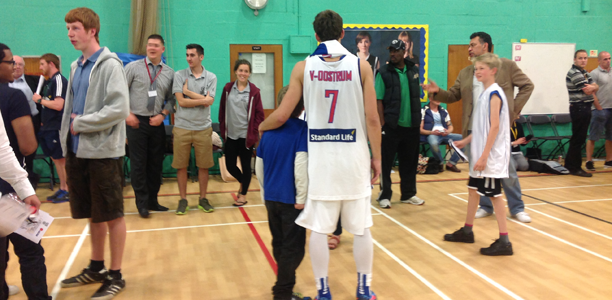
Duco van Oostrum’s final blog about the 2013 Great Britain Under-20s, reflecting on the campaign and into the future.
Great Britain U20s 2013
It’s been over a week now since the Great Britain U20s team claimed its silver medal and promotion to Division A. Almost concurrently, the England U18 achieved a 9th placed finish in Division A, after surviving ‘the group of death’ (3 eventual semi-finalists were in their group) and beating bronze medalist Spain along the way. What a great summer so far for the men’s youth programmes.
It is so important to celebrate this positive success. We always hear about the talent and potential of basketball in the UK, but then end up describing its inevitable failure. In the cases of the U20s and U18s, however, it worked.
Just as we love to analyse all the things that go wrong (just look at comments sections on Hoopsfix—as soon as there’s a loss, everyone knows better; after wins, there’s silence), it is equally important to analyse what went right. I want to make some suggestions here about the U20s—perhaps someone else can reflect on the U18s—but I’m sure there are plenty of overlaps.
First of all, ‘the generation.’ The 1993-generation showed its promise in Portugal at the U16 championship with a first-ever bronze medal. Nurtured from an early identification phase by head coach Simon Fisher, four 93s played ‘up’ during the U16 championships for the 92s in Sarajevo. The coaching team of Fisher and Karl Brown together with team manager Emily Clarke produced a family type atmosphere in the team that the boys still nourish; a young Marc Steutel joined as volunteer coach.
Interestingly, the 1995-generation had the exact same staff structure, achieving promotion and the silver medal at their U16s championship. The work of Fisher, Brown, and Clarke in identifying and creating these teams cannot be overstated. After Portugal, the coaching structure was overhauled for some reason (the 93 age group never again experienced the same coaching structure in subsequent years—new faces, ideas, players came and went, every single year), and only this year at U20s was there a semblance of the Portugal structure and player selection.
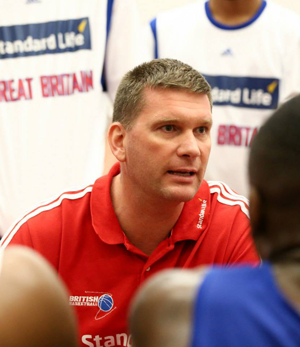
It’s worth listening to coach Leichner in this podcast from Hein News (from 1:25:29 onwards), in particular the way he communicated with the players even prior to training camp. He built a team and followed up.
Everyone who’s been around the team will comment on two things: 1. The family type atmosphere and 2. The mission—‘winning one game at a time.’ It all sounds so simple and logical but every coach would probably agree that such focus is absolute gold dust. All the players bought into the philosophy, with clearly identified roles for everyone, all in a quest of that mission.
In the players group, it was almost a team of the ‘veterans,’ ‘the new ones, and ‘the rookies.’ John Stewart, captain Joe Hart, Raph Thomas-Edwards, and Devon van Oostrum formed the core of the 93 group; Nick Lewis, Matthew Don, Zak Wells, Rowell Graham, Lewis Champion (last cut for the Portugal group) came in as the ‘new ones’; rookies for this team (as 94s) were Grant MacKay, Jordan Spencer and Joe Lockwood.
Then there was the style of play. Initially, the U20s didn’t look to have the type of talent of previous years (87s: Dan Clark, Ashley Hamilton; 88s: Matthew Bryant-Amaning, Ashley Hamilton, Orlan Jackman; 89s: Andrew Lawrence, Will Neighbour; Ben Mockford; 90s: Andrew Lawrence, Will Neighbour, Ovie Soko; 91s: Ryan Richards, Alex Marcotullio, Devon; the 92s: Ali Fraser and Devon – note that this isn’t necessarily the players’ year born but the age groups they played with). Two sixth-place finishes (90s and 92s) were the top results for the GB U20s so far.
From the very first friendly v the U18s, however, the team looked like a team. Even in that first friendly, the U20s ran multiple offensive sets, with most players going in the right positions and with correct timing; the second characteristic was defense and rebounding.
Quickness, smarts, and quick jumping ability allowed the team to stay in front of dribble penetration and dominate the glass against quicker opponents.
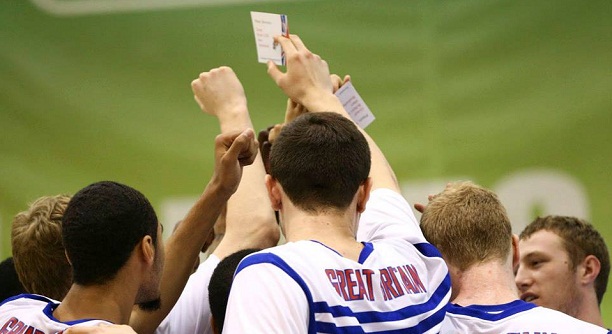
The team featured real shooters: Joe Hart and Nick Lewis. Any help on dribble penetration from the corners would be punished. And then there was the rebounding. Rowell, Raph, and Matthew had great rebounding skills, no matter how undersized they were; Raph also added dribble penetration and a three-point threat. Zak Wells disrupted many an offense with his positioning and surprisingly quick feet. John Stewart became the classic glue guy—no mistakes, tough D, and doing all the little things that were needed to win. Lewis Champion would come off the bench to provide incredible on the ball D, and bring energy, lots of it on both ends off the floor. Grant turned out to be Mr Hustle himself, not afraid to mix it with the big guys. Jordan and Joe Lockwood would fight for their minutes, and remain positive at all times.
Again, clarity about roles, from starters to bench—so tough to establish, but the team and coaching staff managed to get it right.
This GB team also took advantage of the best preparation schedule ever. In addition to the usual Bristol National Teams camp friendlies (v Belgium), they travelled abroad to Helsinki (Finland) and Portugal (games v Portugal and Hungary) and then returned home to play two games v the Netherlands in Ipswich.
And they won them all, some more convincing than others, but they established a winning culture, being able to turn fourth quarter deficits into wins and closing out tight games. They also left for Romania early, making sure acclimatization was not going to be an issue before that all-important game one.
The tough preparation schedule also enabled team bonding off the court. Not only was the tactical expertise in place this year, the social off the court aspect of the team became a focus as well. For the players, the U20s commitment eats up most of the summer holidays. They play almost an entire season in 6-8 weeks and then have to return to US college or their club.
Each year, Great Britain U20 can draw up a list of those who have passed up on the honour of representing their country. I don’t want to go into all this, but it’s clear that the US college route for GB players actually hurts the GB programme in its pathway for creating powerful youth teams. Invariable, it is a struggle to get US college players to commit. GB has had much better success with its Euroclub based players in terms of development and commitment (Dan Clark, Joel Freeland, Mo Soluade, Jules Dang Akodo, Devon van Oostrum).
When players have options to make themselves available or not, especially at the U20s, they ask, ‘do I want to go through all that again? How much fun is it going be?’ For any national team programme, it is so important to pay attention to the social experience of the tournament. And this year, the entire staff got that right.
Players had a busy, clear schedule, and at the same time, they had freedom and were given plenty of individual responsibility. The preparation games v Finland, for example, included not only the two games, but also a walking tour through Helsinki. The tournament routine can become deadening and anything to offset that during the rest days helps teams.
Let’s not forget that this group has had so many different types of experiences over the years; the veteran group has been one of the most loyal in the youth programme’s history, having to cope with all the different coaches, selections, styles. They also made it their mission to have one final go together and to get that promotion in spite of everything that they’ve been subjected to in the past.
For Devon, this was his 6th straight summer of GB/England/Futures/Senior (a record? Not that anyone actually keeps records), sometimes with double GB duty, and that desire to get it right this final time carried over in the entire team.
And then the tournament itself. I’ve written plenty about the games. The day-to-day business is serious hard work for staff. From trying to get all the laundry done (avoiding outrageous hotel prices), to getting the ice baths ready, to getting a readable copy of the film both of your own team and tomorrow’s opponent, it’s all day-to-day around the clock.
Marc Steutel and James Vear could often not start until around midnight with clipping film and doing the preps. The GB team did not experience any muscle type injuries, a credit to Mark Taylor’s regime. Practice time would be allocated according to game time and video analysis and prep required constant flexibility. The daily routine is one of constant negotiation with the organisers and the hotel, lobbying for decent lunch, dinner, and practice times. It’s about so much more than the games. Staff have to put in the hours—no shortcuts. Again, this year, they got it right.
All the hard work and togetherness paid off, securing promotion, and passing that legacy on the U18s who get to play in Division A. Of course, the question of GB next year is the ultimate white elephant. For this reflection, though, the important thing is that the conditions have been put into place for success.
I wish to pay tribute to all the players for U20s that willed their way to this promotion. And to the staff who made that all possible. What to me is less heartening—I apologise for doing the negative thing again, I’m clearly becoming too British—is the lack of player focus in this country. Media coverage for one is restricted to basketball websites.
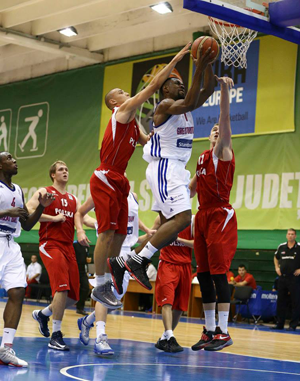
So much more could and should be done with basketball success at media level. Schools, local areas, could all share in the success of their own and the players could receive recognition. One reason aspiring players leave the UK is to experience a culture where they are appreciated as basketball players and don’t have to explain it or make excuses for it. They could become realistic role models for so many young players in the UK who would want some of that success. Even now, no additional U20 players except Devon has been called up for the senior programme—I’d have a thought it would be an open door in terms of player recognition and positive publicity for continuity.
But most national teams, both junior and senior programmes still operate in a world of almost repressed secrecy—it’s a struggle to get any type of information when teams are preparing; club websites seem to be afraid to congratulate their own selected players in fear of breaking some kind of camp ethic instead of clubs being sent a congratulatory message.
Open media celebrating players is non-existent and it’s this lack of player-focused celebration that hurts the basketball world so much. With success, the focus immediately turns to the ‘strategy’ that made it all possible. I have nothing against strategic documents and long term vision and applaud all of that, but why is that the focus in the media? Just imagine some young player actually reading that—what is the audience?
I have no idea why openness and celebration with the media does not exist. Rare press releases come with unfortunate mistakes. Why that matters is that it shows a disrespect to the player, whose name is misspelled, whose club affiliation is listed wrongly, and whose past and present career bio is unrecognisable from reality.
The hard work on the floor must be emulated on the media front—it’s not an ‘add on’ but an absolute essential in fostering the interest of basketball; journalism is a real profession and it’s hard work, requiring research and communication. Just compare our sites here to any other basketball country in the world, click on any national federation website and see how it’s the players who are celebrated and function as role models (I just clicked feb.es—Ricky Rubio, U18 bronze medal, video, stories, whatnot, and you have to get past a picture of the national team players to get into the site).
Finally, the GB U20 and England U18 have success but we have no avenue to celebrate it. Please, if you see any of the players or staff, tell them thank you and congratulate them. I will end on a positive. In a small gym in Ipswich, the GB U20 played the Netherlands– everything was packed, standing room only. After the game, young fans queued up to get signatures and take photographs with the U20s players. Inspiring success.
Image Credits: GB Basketball


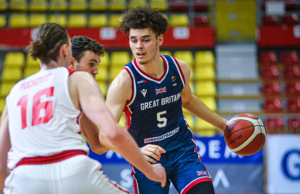
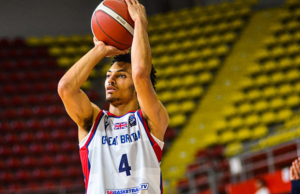
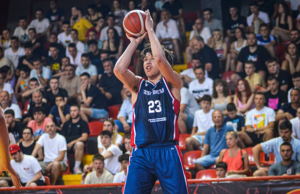

4 Comments